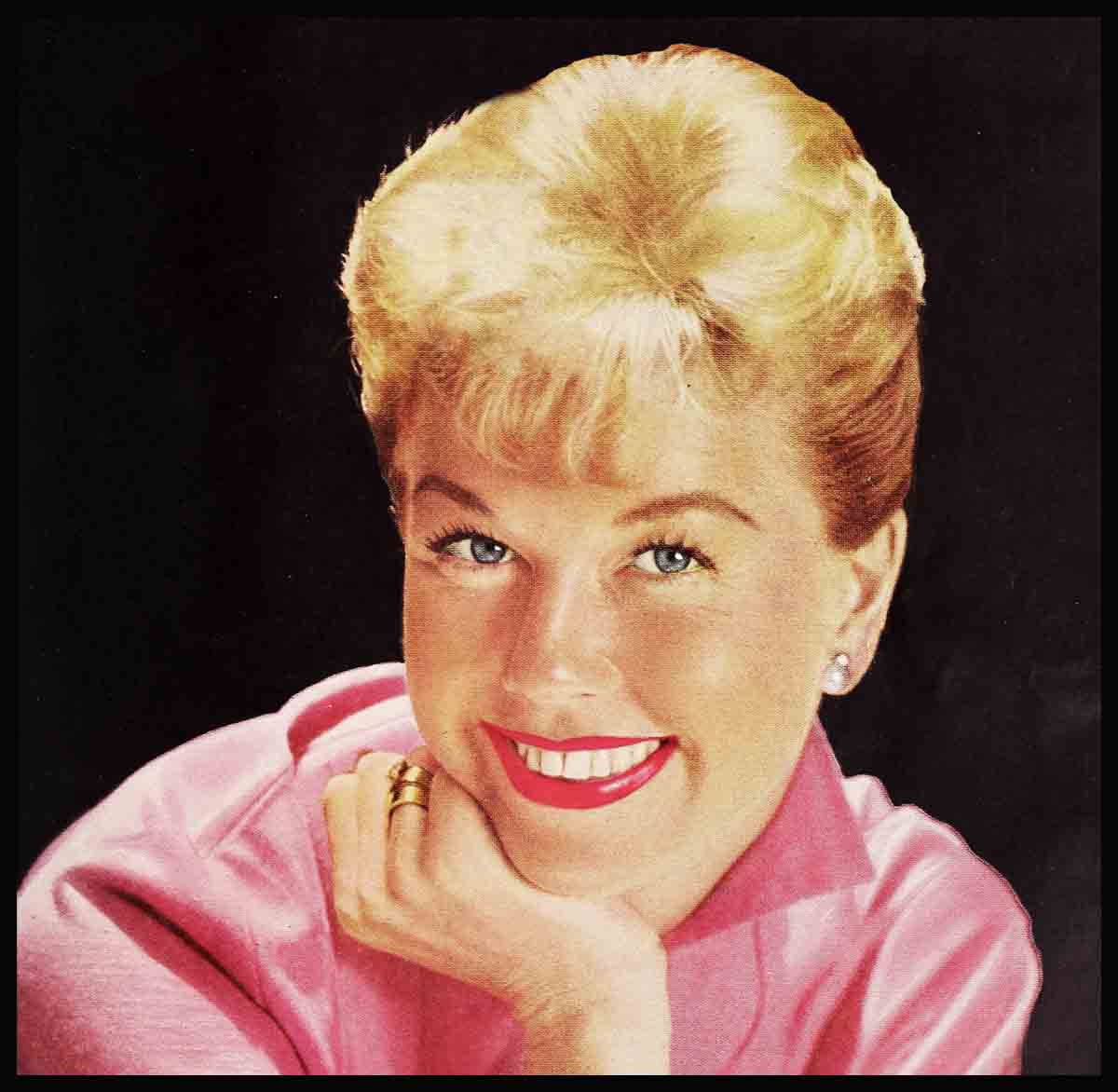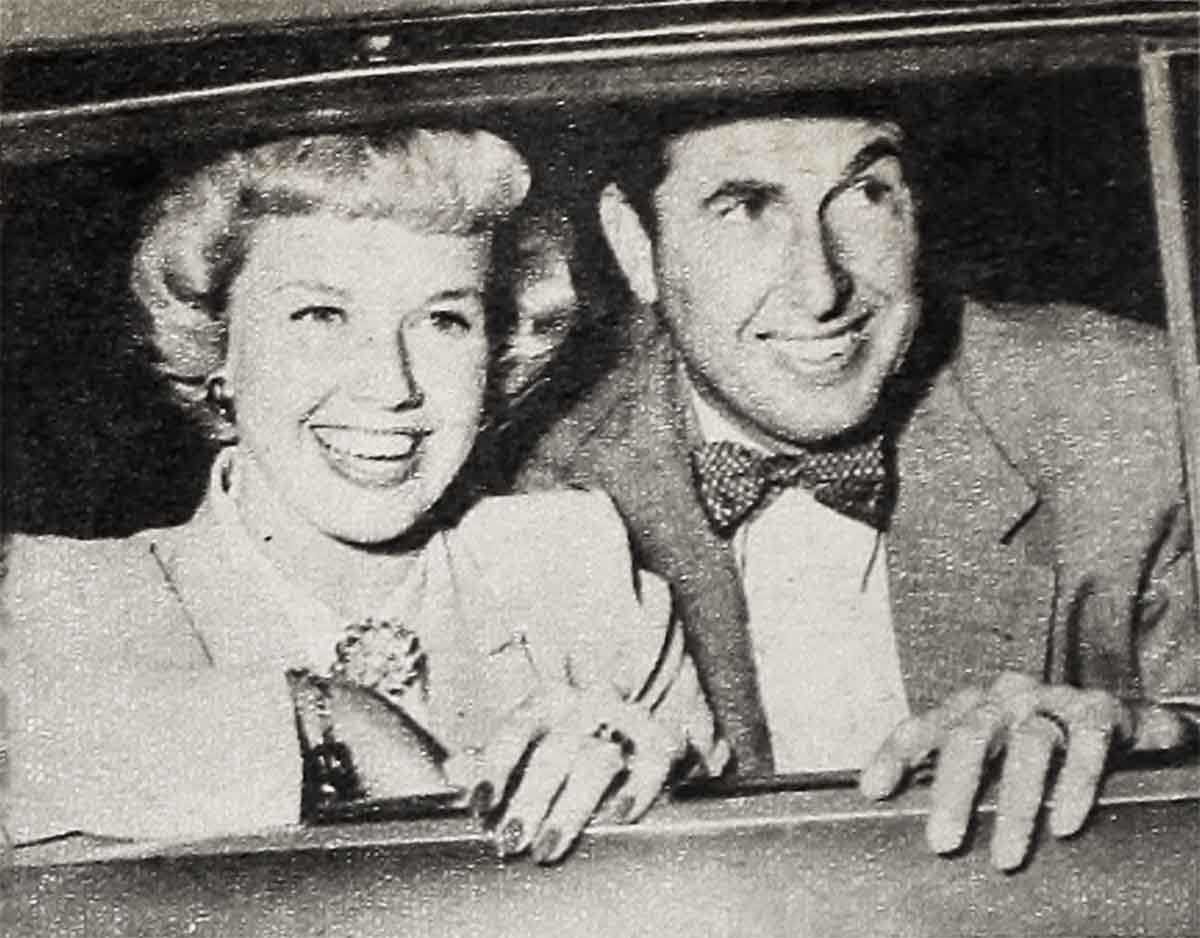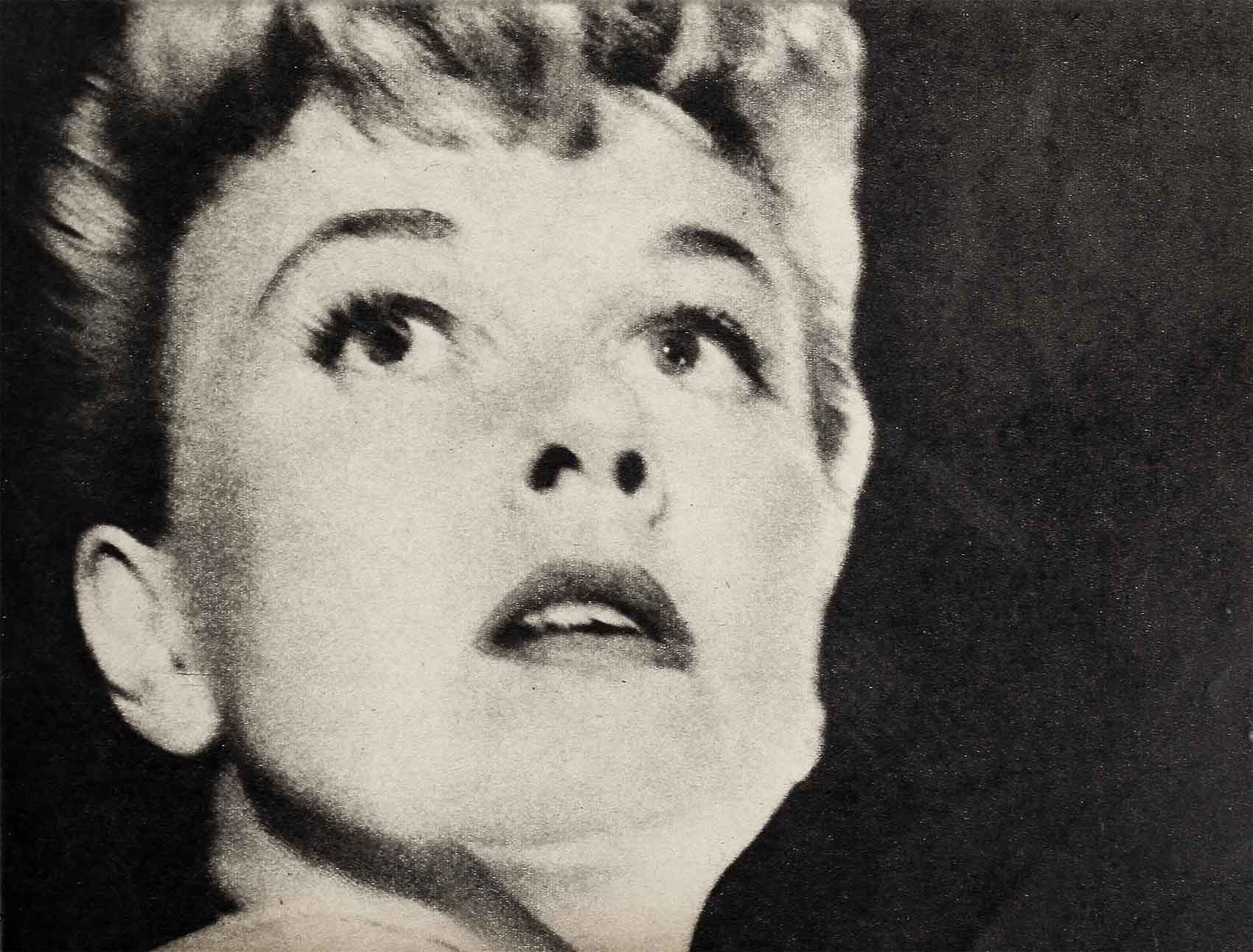
Doris Day’s Escape From Hell!
One afternoon, Doris Day left her studio dressing room and started walking over to the set.
Then the pain hit her.
It hit her like the shock of an unexpected breaker in an angry sea and she was drowning with it. Her heart was a hammer and she couldn’t catch her breath and she was drowning in a sea of pain . . .
She had just taken the first step down the road to a hell that she was to live in for almost two years.
A hell of fear . . . the kind of fear that twists your gut.
Then, as suddenly as it had come, the pain was gone.
She drew a shuddering breath, stood for a few minutes to make sure her knees wouldn’t buckle with the first step—and told herself that she hadn’t felt anything at all. It hadn’t happened.
Except that it came again and again, while her heart missed beats and her breath disappeared.
Cancer!
The word came flaming into her mind one day and she couldn’t get it out. Cancer. That must be what she had.
But it wasn’t cancer; it was fear.
Two years ago, Doris thought she was dying of cancer. Actually, she was suffering from fear. Oh, the pain was real enough; it hurt.
But it was the fear in her mind, not cancer, that caused the pains in her body—plus the suffering she has endured in her life so far, and the heartbreaks she has lived through.
Fear . . .
It was two years ago when Doris Day—movie star, wife, mother—first began being unable to catch her breath.
She couldn’t imagine what that was all about, so she ignored it. For one thing she was a most sincere Christian Scientist and she could not believe in illness. Besides she wasn’t ill. She just couldn’t catch her breath.
She was under terrific pressure at that time, as any top star always is. Her WARNER contract was winding up. She didn’t know whether to resign from the only studio she had ever worked for, or if she dared to strike out on her own, with her husband Marty acting as her producer.
She couldn’t decide about her records either. She could sing any love song into a hit, but suppose the public got tired of that? She thought of trying out rhythm numbers, blues numbers, comedy bits. But—did she dare risk changing her style? Maybe she’d flop if she did.
There were night club offers and tv offers. Should she try that? Which would be best? Should she risk public appearances again? Yes? No?
Most of all she wanted to find out about herself as a dramatic actress. She was a million-dollar smash in musicals but she wanted to get within nomination distance of an Academy Award. Or would that ruin her completely?
Decisions. Decisions.
And interviews. Photographs to be posed for. Costume fittings. Her Marriage to Marty, which was a full-time job. And Terry, her son, to help grow up—another full-time job. Recording sessions, and business conferences, and church attendance, and answering phone calls, and memorizing scripts, and shooting pictures, and answering letters, and making personal appearances, and doing benefits.
She thought she was taking it all in stride. Except for that business with’ her breath. So she kept on ignoring that.
Until that afternoon when the pain hit.
Then it was gone, and she told herself she hadn’t felt it at all. She wouldn’t bother mentioning it to anyone.

Fear becomes one word
It came again, and she lived with it, and tried to keep the fear from showing.
For weeks she managed to conceal from Marty that she wasn’t sleeping. At the studio she’d say that she had eaten at home and at home that she had eaten at the studio—so no one would know she couldn’t keep her food down.
She put on her bulkiest clothes to conceal her weight loss. She kept telling herself it would go away, but instead the pain became more constant, her heartbeat more irregular and her breath came in shorter and shorter gasps.
Until suddenly the fear became a word: cancer. That was what a doctor would tell her.
But she couldn’t go to a doctor. She couldn’t go to a hospital. She was a Christian Scientist, and she couldn’t ignore the basic teachings of her religion. Marty shared her faith. Terry went to Sunday School. She couldn’t destroy their faith, not even if it meant facing death alone.
So day after day she lived alone in her own. private hell. Well, perhaps not completely alone. . . .
The complete lack of privacy in which stars live was in Doris’ case a help. The studio, Marty, her mother, her friends, suddenly surrounded her. They got her to see a doctor. The doctor told her she did need a bit of minor surgery. But she didn’t have cancer! It was a harmless tumor, not the dreaded disease that she was so terrified of. Out of her terror she submitted to the surgery, quickly recovered, and felt perfectly fine.
For a few months.
Then the pain returned. The pain and the skipping heart beats and the complete lack of breath.
This second attack chilled Doris with nerve-shattering fear. In her mind she knew she wasn’t really ill—she’d finally been convinced of that—but she had all the symptoms! Again she tried to hide her terror from Marty. She told herself this was her actress’ imagination at work. But the pain, the gasping for air, that was real. Real and yet imagination.
So it could only be one thing, Doris started thinking, she had crossed the terrible borderline. She no longer knew what was unreal, what was real. She must be mad, Doris decided. And added to her fear of cancer was the hell of fearing for her very sanity!
This time she was the one who found a doctor. He wasn’t a psychiatrist. He was just a very understanding medical man. He said to her, “Get a notebook. Write down everything that comes into your head. Whatever you think of. Then read what you’ve written—and think about it. And then if your symptoms don’t stop, come back and see me. But I think that when you face life honestly, without being afraid of living, then you will be well.”

A look into the past
Doris felt very silly that afternoon, buying a kid’s notebook—like the ones she had had in school at Cincinnati. Suddenly she found herself thinking of her first screen test, and she wrote about it, there in the notebook, first of all.
She had arrived at Warners’ looking like a teenage tomboy, wearing jeans and a shirt and she let Mike Curtiz, the director, and Jack Warner, the studio head, gather the idea that she’d dressed this way to prove they couldn’t impress her.
But that hadn’t been the truth. Those were the only clothes she had.
She had broken down singing “Sentimental Journey” for them. Her first hit tune, and she should have been able to get through it any time. She let Curtiz, Warner and herself think she was just nervous. But again that hadn’t been true. She had broken down because that very morning she had filed for her divorce against George Weidler, whom she adored.
The Doris Day of 1955, writing in her notebook, wondered why the Doris Day testing for Romance On The High Seas couldn’t have been honest with herself. She had been honest in court. She hadn’t made any accusations against George Weidler. She loved him. All she had said, asking for her freedom, was that George had broken her heart. She hadn’t even told the judge that George had asked for the divorce. She had just said, “He left me heartbroken.”
The Doris Day of 1955 thought of Marty. When she had married Marty she hadn’t wanted to bother with a honeymoon. She was too sensible to bother with silly things like honeymoons.
But that wasn’t quite the whole truth, either. The first time she had married, at seventeen, she had wanted to do every romantic thing.
Too much separation
He was Al Jordon. He was a trombonist in Jimmy Dorsey’s band. They fell in love and got married.
Then, just as she was eighteen, she discovered she was going to have Terry. She took a little house back in Cincinnati and wrote Al every day, sometimes twice a day, sometimes three times. He had to be on the road. Doris was bitterly lonely. She had barely enough money to live on, and Al’s letters, arriving special delivery and usually at 3 A.M., broke up her “wretched sleep. Sick as only a lonely, pregnant girl can be, Doris reached the breaking point one night. She yanked off her wedding ring—she didn’t want it—and she threw it out the window.
Only that hadn’t been true, either. She didn’t want to lose her wedding ring. She wanted what the wedding ring meant—a husband with her.
The band business got worse. The separations between Al and Doris lengthened.
Doris got her divorce. She didn’t ask for support of her baby, Terry. She told herself she would manage. Somehow. The somehow turned out to be singing on a Cincinnati station for an announcer’s wage of $64. She hadn’t been too proud to take it. Sure, she had already made “Sentimental Journey,” and sung on the Hit Parade. But she took the $64, which fed her and the baby, and when Jimmy Dorsey offered her a job it was pure heaven. And more heavenly, yet, when she met George Weidler.

Some more untruths
She worshipped George Weidler and felt that he was a great artist; in Hollywood he would find thousands of jobs.
He didn’t. In Hollywood there was a housing shortage and Doris and George had to buy a trailer. Doris cooked. Doris cleaned, and planted flower boxes on the windows of the trailer and sang and sang. She didn’t want a career, she told herself. She just wanted to be George’s wife.
Writing in her notebook, the Doris Day of 1955 realized this, too, had been one of her bits of untruth with herself and life—the untruth she had sold herself and sold George Weidler—that she didn’t want to sing any more. One day she was offered a booking at the LITTLE CLUB in New York. There was no money, no work for George, no food in the trailer.
George insisted that she take the job. She went. Opening night she got a telegram from him; he told her not to come back. He was through.
The Doris Day of 1955 realized this was one of the nights she had really died. She had gone on for that first show, laughing through her tears, singing over her sobs. She got a release from the club and flew to Hollywood. But when she got to the trailer George was gone.
She searched for him, days . . . weeks. And then, when she had given up, she ran into him on Hollywood Boulevard. She took one look at him, and knew there was a profound change in him. She stammered, “Can we talk somewhere?”
Over a cup of coffee, he told her. He had found religion. He was at peace with himself. By every gesture he told her something else: she was still desperately in love with him, but he was completely out of love with her. She agreed to give him his freedom.
She made the test for Romance On The High Seas and signed a contract with WARNERS. Now she could afford to have her baby with her. She could send her mother some decent money. Stardom she didn’t think about. She was too unhappy.
Yet stardom had come, and that was where Marty had come in. Marty, the nice man in her agent’s office. Then Marty, the nice man she liked so much and whom Terry loved. And Marty with whom she had made such a sensible, calm marriage.
The Doris Day of 1955 writing in her notebook stopped. Was this the truth? Had she really married Marty because he was so good and her son liked him and he knew show business and he guided her career so well?
She stopped. She stopped the writing for months. And made Love Me Or Leave Me. She was so busy with the picture that she forgot her gasping breath, forgot her hammering heart, forgot to be afraid of living.
Then she was making Julie, which Marty produced, and she had a million things to do and she didn’t have time to feel anything really.
It was while she was making Julie that she suddenly realized she had already found the road back, the path from hell to happiness, the power to live life without fear.
Perhaps it was the months of examining herself and learning to understand herself each time she wrote in her notebook . . . or perhaps the sudden realization that she had nothing to be afraid of. Whatever it was, it happened in a split second. One day she was playing a love scene with Louis Jourdan. Marty was standing behind the camera. She had looked up and seen Marty watching her, and in his eyes there was such complete devotion.
She felt her heart throb—but it had been a good throb. She had drawn her breath, and it was a good, long breath. “Wait a minute,” she said, moving out of the scene—and she had gone across and kissed Marty.
“You okay?” he asked, as a husband does, not talking things too big.
“Perfect!” she answered, and she knew she was! She had escaped her personal hell. From that moment on, she could face herself, actress enough to go into scenes, woman enough to love her husband, celebrity enough to live up to every bit of it.
Life, in other words, was wonderful.
THE END
BY HARRIET FRANKLIN
Doris Day will soon be seen in the Warner Bros. musical film Pajama Game. Watch for her also in Paramount’sTeacher’s Pet, RKO’s Curtain Going Up.
It is a quote. MODERN SCREEN MAGAZINE APRIL 1957




